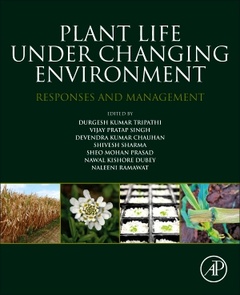Plant Life under Changing Environment Responses and Management
Coordonnateurs : Tripathi Durgesh Kumar, Singh Vijay Pratap, Chauhan Devendra Kumar, Sharma Shivesh, Prasad Sheo Mohan, Dubey Nawal Kishore, Ramawat Naleeni

Plant Life under Changing Environment: Responses and Management presents the latest insights, reflecting the significant progress that has been made in understanding plant responses to various changing environmental impacts, as well as strategies for alleviating their adverse effects, including abiotic stresses. Growing from a focus on plants and their ability to respond, adapt, and survive, Plant Life under Changing Environment: Responses and Management addresses options for mitigating those responses to ensure maximum health and growth. Researchers and advanced students in environmental sciences, plant ecophysiology, biochemistry, molecular biology, nano-pollution climate change, and soil pollution will find this an important foundational resource.
1. Heavy Metal Stress and Plant Life: Toxicity, Uptake Mechanisms, and Alleviation 2. Regulation of Temperature Stress in Plants 3. Salinity and Its Tolerance Strategies in Plants 4. Regulation of Drought Stress in Plants 5. Heavy Metal Toxicity Regulation in Plants 6. Plant Responses to Radiation Stress and Its Adaptive Mechanisms 7. Regulation of Low Phosphate Stress in Plants 8. Regulation of Flood Stress in Plants 9. Heavy Metals, Water Deficit, and Their Interaction in Plants: An Overview 10. Metalloids in Plants: Present, Past, and Future Research 11. Physiological Responses of Plants to Herbicides 12. Abiotic Stress in Plants in Regulation of Photosynthesis under Abiotic Stress 13. Abiotic Stress and Horticultural Products: Tolerance and Management 14. Effects of Abiotic Stresses on Sugar Cane Plants, with Emphasis on Those Produced by Wounds and Prolonged Post-Harvest Periods 15. Abiotic Stress-Induced Programmed Cell Death in Plants 16. Nanoparticles: a New Tool to Induce Tolerance to Abiotic Stress in Crops 17. Regulations of Reactive Oxygen Species in Plants’ Abiotic Stress: An Integrated Overview 18. Plant-Microbe Interactions in Plants and Stress Tolerance 19. Phytohormonal Signaling under Abiotic Stress 20. Role of Small RNAs in Abiotic Stress Tolerance 21. Polyamines and Abiotic Stress Tolerance in Plants 22. The Role of Sugars in the Regulation of Environmental Stress 23. The Role of Proteomics and Abiotic Stress Tolerance in Plants 24. Phytohormones and Their Metabolic Engineering for Abiotic Stress 25. Abiotic Stress Tolerance in Plants: System Biology Approach 26. Plant Single-Cell Biology and Abiotic Stress Tolerance 27. Nanoparticle Application and Abiotic Stress Tolerance in Plants 28. The Role of Aquaporins during Plant Abiotic Stress Responses 29. Tolerance Mechanisms of Medicinal Plants to Abiotic Stresses 30. Regulation of Calvin Cycle under Abiotic Stresses: An Overview 31. Roles of MicroRNAs in Plant Development and Abiotic Stress Tolerance 32. Nitric Oxide Under Abiotic Stress Conditions 33. The Role of Metabolites in Abiotic Stress Tolerance 34. The Role of Melatonin and Serotonin in Plant Stress Tolerance 35. The Role of Post-Translational Modifications of Proteins under Abiotic Stress 36. Circadian Regulation of Abiotic Stress Tolerance in Plants 37. Plant Genes for Abiotic Stress 38. Ionomics and Abiotic Stress Tolerance 39. Root System Behaviour and Abiotic Stress 40. Exploring Plant Rhizobacteria Synergy to Mitigate Abiotic Stresses: A New Dimension Towards Sustainable Agriculture 41. Management of Abiotic Stress and Sustainability
Researchers and advanced level students in Environmental Sciences, Plant Ecophysiology, Plant Biochemistry, Plant Molecular biology, Nano-pollution Climate change, Plant microbe interactions, soil pollution
Dr. Durgesh Kumar Tripathi is currently an Associate Professor at Amity Institute of Organic Agriculture, Amity University Uttar Pradesh, Noida, India. He is the recipient of ‘Dr DS Kothari Post-Doctoral Fellowship’ of the UGC, New Delhi. Dr. Tripathi has received his D.Phil. in Science from University of Allahabad, India. During this period, Dr. Tripathi worked extensively on phytolith analysis, crop stress physiology, agro-nanotechnology and molecular biology. He has expertise on laser spectroscopy. His research interests encompass stress tolerance mechanisms in plants. Presently, he is working with nano-materials and their interactions with plants to find out their detoxification mechanisms, he is also working on Silicon, Nitric oxide and hormonal crosstalk against abiotic stress in plants.
Dr. Singh obtained his PhD from the University of Allahabad on topic “Oxidative stress and antioxidant system in some cyanobacteria simultaneously exposed to UV-B and heavy metal. He has authored 102 publications, as well as editorials in reputed journals. His area of research interest is the role of nitric oxide and hydrogen sulphide signalling in the regulation of abiotic stress in plants. Dr. Singh is also working as an editor and reviewer of several reputed international journals.
Vijay Pratap Singh is an Assistant Professor, Department of Botany C.M.P. Post Graduate College, University of Allahabad, India. Dr. Singh has obtained his D.Phil. degree from University of Allahabad. He has authored 95 publications including book chapters and editorials in reputed journals. He has edited several books with Elsevier, Wiley, CRC Press, Nova Publisher, Studium Press, etc. His area of research interest is regulation of abiotic stress in plants with special emphasis on nitric oxide, hydrogen sulfide, reactive oxygen species and phytohormonal signaling. Dr. Singh is also working as an editor and reviewer of reputed international journals.
Devendra Kumar Chauhan i
- Covers both responses and adaptation of plants to altered environmental states
- Illustrates the current impact of climate change on plant productivity, along with mitigation strategies
- Includes transcriptomic, proteomic, metabolomic and ionomic approaches
Date de parution : 04-2020
Ouvrage de 1012 p.
19x23.3 cm



